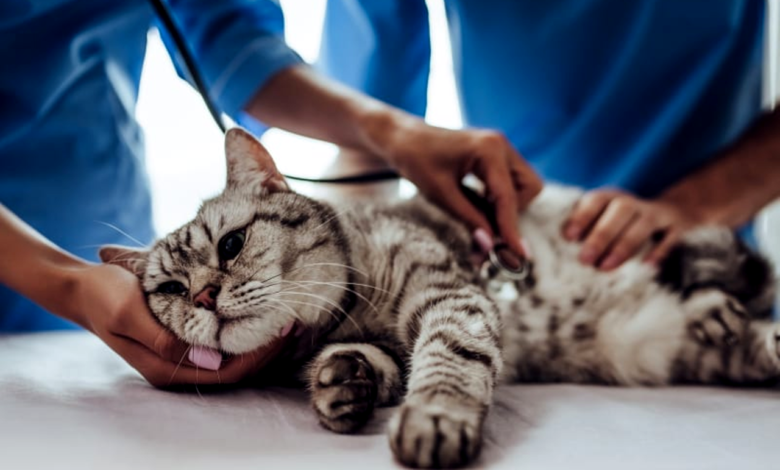
Cat Illnesses & Symptoms
As a cat owner, it’s essential to be attuned to your feline friend’s health and well-being. Cats, while generally resilient, can still fall victim to various illnesses and health concerns. Being able to identify the symptoms early on can make a significant difference in the effectiveness of treatment. In this article, we will explore some common cat illnesses, their symptoms, and how to respond to them promptly.
Read More: What are some common cat illnesses & symptoms?
Introduction to Cat Illnesses & Symptoms
Cats are renowned for their independence and mystery, but these qualities can sometimes make it challenging to detect when they are unwell. This article aims to guide cat owners in recognizing potential health issues by observing changes in their behaviour, habits, and physical appearance.
Common Cat Illnesses

Gastrointestinal Issues
Digestive problems like vomiting and diarrhoea are common signs of gastrointestinal distress in cat illnesses. Sudden changes in diet or the ingestion of something indigestible can lead to these issues.
Respiratory Infections
Cats are susceptible to respiratory infections, especially in crowded or stressful environments. Sneezing, coughing, and nasal discharge are key indicators of such infections.
Urinary Tract Problems
Urinary tract infections or blockages can cause pain and discomfort for cats. Frequent trips to the litter box, straining to urinate, or blood in the urine might signal such problems.
Skin Conditions
Skin conditions can result from allergies, parasites, or fungal infections. Excessive itching, redness, hair loss, or scaly skin may indicate underlying skin problems.
Dental Disease
Dental issues are often overlooked but can seriously affect a cat’s overall health. Bad breath, swollen gums, and difficulty eating are signs of potential dental problems.
Eye Infections
Watery or red eyes, discharge, and frequent squinting could suggest an eye infection. Prompt attention is essential to prevent complications.
Recognizing Symptoms
Changes in Behavior
Cats might become lethargic, withdrawn, or unusually aggressive when they’re not feeling well. Pay attention to any drastic shifts in behaviour.
Altered Eating Habits
A sudden loss of appetite or excessive eating could indicate underlying health issues. Monitor your cat’s eating habits for any changes.
Breathing Abnormalities
Laboured breathing, wheezing, or rapid breathing are alarming signs that require immediate veterinary care.
Litter Box Issues
Changes in litter box behaviour, such as urinating outside the box, could signal urinary tract or other health problems.
Coat and Skin Changes
A cat’s coat is a good indicator of its health. Dullness, excessive shedding, or flaky skin could suggest underlying issues.
Oral Health Symptoms
Difficulty chewing, excessive drooling, or reluctance to eat might indicate dental problems. Dental health is crucial for a cat’s overall well-being.
When to Consult a Vet
It’s always best to consult a veterinarian if you notice any unusual symptoms in your cat. Early intervention can prevent the worsening of health issues.
Taking Preventive Measures

Balanced Diet
A well-balanced diet rich in nutrients is essential for maintaining your cat’s health and immunity.
Regular Exercise
Engage your cat in regular play and exercise to keep them physically active and mentally stimulated.
Hydration Matters
Ensure your cat has access to clean, fresh water at all times to prevent dehydration.
Clean Living Environment
A clean and stress-free environment can contribute to your cat’s overall well-being.
Stress Management
Cats can be sensitive to changes in their surroundings. Minimize stressors to promote good health.
Read More: Why Is My Cat Breathing Heavily?
FAQ’s
- Can I treat my cat’s respiratory infection at home? While minor cold-like symptoms might resolve on their own, it’s advisable to consult a vet for proper diagnosis and treatment.
- How often should I brush my cat’s teeth? Regular dental care is essential. Aim for brushing your cat’s teeth a few times a week to prevent dental issues.
- My cat’s eating habits have changed. Should I be concerned? Yes, changes in eating habits can signal underlying health problems. Monitor closely and consult a vet if needed.
- Are there any vaccines my cat needs? Yes, essential vaccines can protect your cat from serious illnesses. Consult your vet to determine the appropriate vaccination schedule.
- What can I do to reduce my cat’s stress levels? Providing a stable environment, interactive toys, and a consistent routine can help alleviate stress in cats.
Conclusion
As a responsible cat owner, being attentive to your cat’s health is paramount. By recognizing early symptoms of common cat illnesses, you can ensure your feline companion leads a long, happy, and healthy life.








One Comment